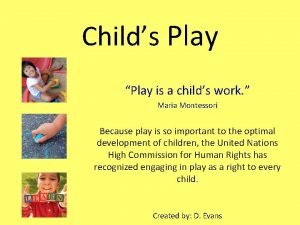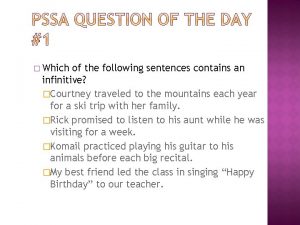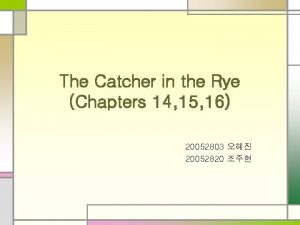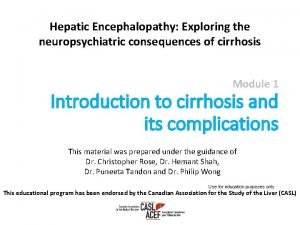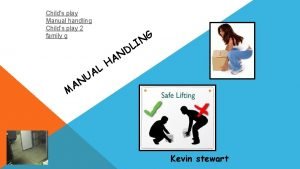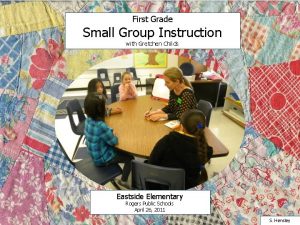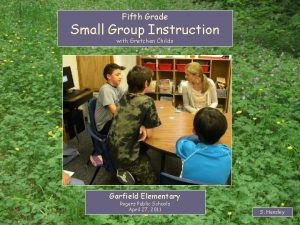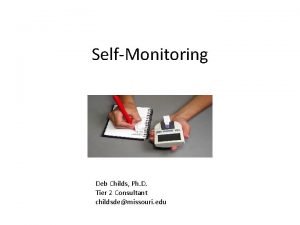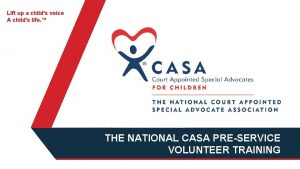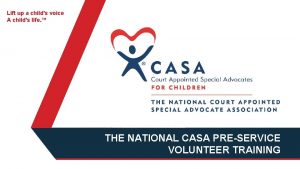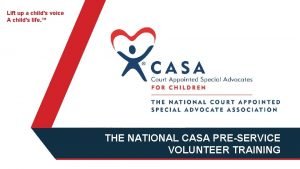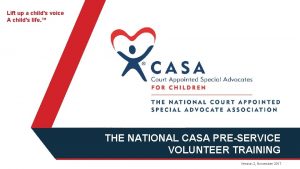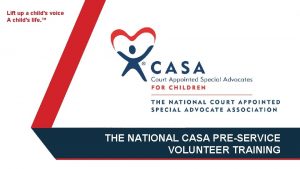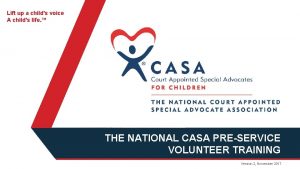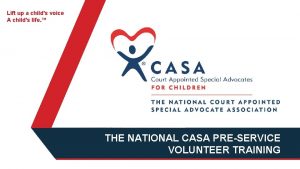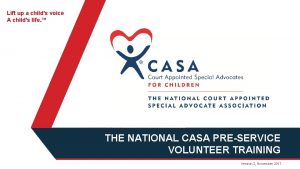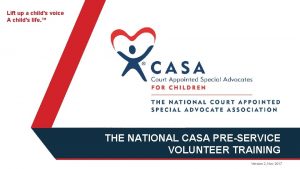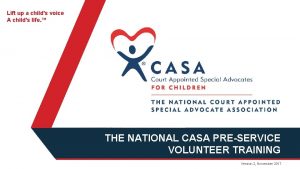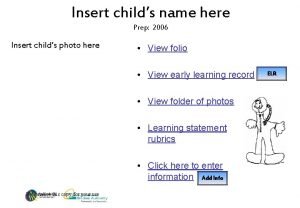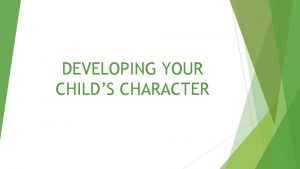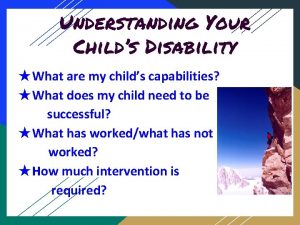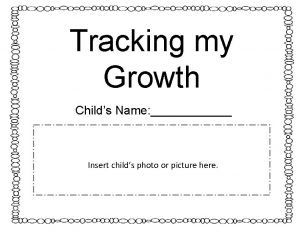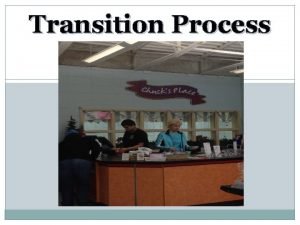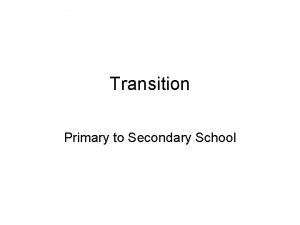HOW TO ENRICH MY CHILDS LIFE FOR TRANSITION























- Slides: 23

HOW TO ENRICH MY CHILD’S LIFE FOR TRANSITION TO PRIMARY SCHOOL SWATI POPAT VATS

A Thought that inspires the Journey of Parenting: ØIf I had my child, to raise all over again, I’d finger paint more and point the finger less. ØI’d do less correcting and more connecting. ØI’d take my eyes off the watch and watch with my eyes. ØI would care to know less and know to care more. ØI would be firm less often and affirm much more. ØI would build self-esteem first and the house later….

AS YOUR CHILD TRANSITS TO HIGH SCHOOL HE WILL NEED AND DEPEND ON THE EXECUTIVE FUNCTIONS OF THE PREFRONTOL LOBE IN THE BRAIN What are you doing to help it develop?

Enrich your child’s life by ensuring that the child can use the executive functions of the brain……which are these functions?

The executive functions of the brain l Focus And Self Control l Perspective Taking l Communication l Cognitive flexibility l Inhibition l Ability to defer gratification l Estimating time l Working memory

Promote communication Learn to identify ways to communicate with your kids n Don’t drone n Have eye contact n Understand ‘hovering’ n Understand ‘pull for attention’ n Pay attention n Ask specific queries n

Promote Focusn n n Play Games That Require Children To Pay Attention. I spy Puzzles Red light – green light Musical chairs Bell game

Promote Cognitive Flexibility Ø Have Children Play Sorting Games With Changing Rules. Ø Encourage Children To Pretend And To Make Up Pretend Stories. Ø Give Children Puzzles.

Promote Working Memory. Play Games That Have Rules. n Have Children Make Plans, Follow The Plans, And Then Discuss What They Accomplished. n

Promote Inhibitory Control. Play Games Where Children Can’t Go On Automatic Pilot. Ø Peg-Tapping Game. In the Peg-tapping game, children are supposed to do the opposite of what you do. Ø Day-Night Task. When shown a picture of a black background with a yellow moon and stars, children are supposed to say ‘day’ etc. Ø “Simon Says, Do the Opposite. ” Ø

Promote Inhibitory ControlØ Select Computer Games Carefully. Ø Hearts and flowers Ø Flanker tasks, such as Feed the Fish. incorporates a technique called the Eriksen flanker task. There’s a big fish in the middle of the computer screen. The task is to feed this fish. If the fish is pointing right, children need to press the right-hand button to feed the fish etc.

Promote Perspective taking Ø Why is it important in children? Ø Helps make sense of own and others experiences Ø Better adjustment to school Ø Helps them understand what teachers want and expect. Ø Helps in learning to read

Games for perspective taking Ø Role play games Ø Drama Ø Play games of changing roles

Attention Deficit Disorders And Executive Functions Of The Brain There are three kinds of ADHD— attention deficit hyperactivity disorder 1. There’s ADHD of the hyperactive type; 2. There’s ADHD of the inattentive type; 3. And there’s a combined type of ADHD.

Attention Deficit Disorders And Executive Functions Of The Brain l l l l l Inhibition: is the ability to avoid distractions and stop themselves. This can be tested by a ‘stop task, ’ Children with ADHD are most likely to need the stop signal to occur earlier in the process for them to be able to stop themselves. Ability to defer gratification: Children with ADHD may be more likely to choose an immediate reward over a reward that will happen later, even when the delayed reward is a bigger or better reward. Estimating time: People of all ages with ADHD are likely to be less accurate in estimating how long things will take. Working memory: Children who have the inattentive form of ADHD have a harder time holding different things in their memory at the same time.

What makes children misbehave? • • Embarrassment. Overbearing and insensitive adult Unrealistic deadlines. Family argument prior to school. Bully in school/bus/play area. Impatient adult Inability to complete a task that is too difficult.

The transition to primary school Ø Transitions tend to be some of the most difficult and stressful moments in the life of a child. At these times teachers and parents often find themselves dealing with more challenging behaviors and feeling more like police officers than nurturing caregivers.

'six steps to conflict resolution' 1. Approach the situation calmly 2. Recognize the children’s feelings 3. Gather information and restate the problem 4. Ask for ideas / solutions 5. Retell any suggested solution 6. Support children to act oh their decision

What is an effective transition? Effective transition is when children……. Ø Understand ‘what is coming’ ahead of time. Ø Have some experience of the new environment and the people in it. Ø Feel safe, secure and valued in their new school. Ø Know that staff at school will listen to them and respect what they say Ø Understand what is expected of them (learning behavior) in school Ø Know what they should/shouldn’t bring into school. Ø Enjoy the experience of moving to the ‘big school’. Ø Feel that they have a measure of control over the process

Why do problems arise with transition? Problems can occur during transition for a variety of reasons : For instance:

Ø Ø Ø Ø The children might be unsettled or upset about the move from one setting to another. The children may have developed very close relationships with both staff and children in Jumbo Kids. They will miss them! There’s a very different ratio of adults to children in a primary class than there is in an Early years setting, meaning it is almost impossible for the children to get as much individual adult attention. Behaviour issues may surface, particularly in those children who are confused by the change. Progress in learning and development can slow down while the child adapts to the school setting. children will have to depend on their independent skills for accessing toilet, looking after their bags and themselves. There will be a jump in the learning content in the primary years

How will we help your child? Your child will visit a primary classroom in the next month Ø Teachers will talk to them and help them become independent Ø Children will continue with three line format in standard one and two Ø Primary teachers will come to observe Sr. kg class Ø More emphasis on Copying from the blackboard and reading in sr. kg Ø More worksheets in the first few months in primary Ø

In everything you do as a parent, remember that ……. . Only you can enrich your child’s journey to primary school. All the best. swatipopat@podar. net
 Childs work childs play
Childs work childs play Grammar to enrich and enhance writing
Grammar to enrich and enhance writing Which of the following sentences contains
Which of the following sentences contains Enrich health and psychology
Enrich health and psychology Prepare/enrich facilitator manual
Prepare/enrich facilitator manual Enrich
Enrich Love and logic
Love and logic Perceptual reasoning
Perceptual reasoning Catcher in the rye chapter 15
Catcher in the rye chapter 15 Childs pugh mdcalc
Childs pugh mdcalc Naughtia childs porno
Naughtia childs porno Child's play manual handling
Child's play manual handling Kenna childs wikipedia
Kenna childs wikipedia Dee childs
Dee childs A childs sleep poem
A childs sleep poem Clear liquid diet foods
Clear liquid diet foods Gretchen childs
Gretchen childs Gretchen childs
Gretchen childs Deb childs
Deb childs Aaets
Aaets Kontinuitetshantering i praktiken
Kontinuitetshantering i praktiken Typiska drag för en novell
Typiska drag för en novell Nationell inriktning för artificiell intelligens
Nationell inriktning för artificiell intelligens Returpilarna
Returpilarna
